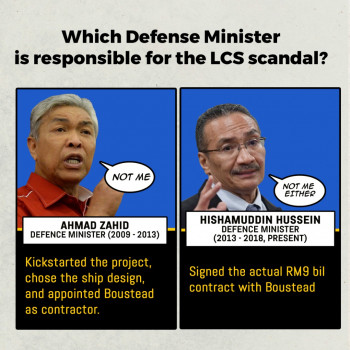By Steven Sim

The result of the Permatang Pasir by-election showed that UMNO-Barisan Nasional is at its wits’ end. The party is plagued with internal power struggles at the grassroots level with local warlords vying for what is left of their traditional power base in Permatang Pauh.
This is one factor that may have resulted in protest votes against the party by its own member. One thing that appalled both voters and observers alike was UMNO fielding a candidate with a record of financial misconduct and had been disbarred by the Bar Council. On top of that, Rohaizat Othman was said to be not so popular with many local UMNO members. Insiders indicated that the local UMNO members would have preferred Zaidi Mohd Said, the Permatang Pauh UMNO Youth chief.
Yet, Rohaizat, despite his many professional and personal flaws as well as objections from the grassroots, managed to be selected as UMNO’s Permatang Pasir candidate – clear evidence of the existence of powerful warlords who can push their own agendas and influence the highest echelon of the party when necessary.
The use of race and religion in their campaign also showed UMNO’s desperation to win votes. On the one hand, in Malay-majority areas, UMNO campaigners accused PAS for being a traitor to Islam and subservient to secularist DAP, while labelling Anwar Ibrahim as a traitor to the Malay race. On the other hand, in non-Malay majority areas, UMNO through its partners in the Barisan Nasional coalition, MCA and Gerakan, used scare tactics to instill fear in the people by portraying PAS as an Islamic fundamentalist party who will infringe on the rights of non-Muslims by banning banning the sale and consumption of alcohol and pork should they win.
While the spirit of Merdeka still permeates the air through the presence of flags on buildings and vehicles, and the concept of “1Malaysia” being broadcasted all over the place, UMNO and Barisan Nasional still see it fit to pit one race against another and to portray themselves as heroes of a particular race instead of all Malaysians. What was unfortunate was, UMNO’s coalition partners played along despite a very clear message from the Rakyat that we have rejected communal-based politics.
UMNO-BN agenda becoming irrelevant
UMNO had purportedly spent millions of ringgit in Permatang Pasir, handing out cash and goodies to locals, employing the Manek Urai strategy of promising “Anak Emas” development and employing government machinery for their campaign purposes. The result? A small improvement of 1% compared to 2008!
There was no doubt that the UMNO-owned media would gleefully report that the PAS majority had declined and UMNO has achieved better results this time. Yet, if reality does not set in after seven consecutive defeats out of eight by-elections in the past year, UMNO will remain irrelevant until the grand showdown that is the 13th General Election.
It is ironic that after spending millions of ringgit and employing all sorts of unethical tactics, UMNO could only manage to return such a minute improvement in Permatang Pasir.
Lessons for UMNO-BN are also lessons for PAS-Pakatan Rakyat
The results of the Permatang Pasir by-election should be taken by the Pakatan Rakyat as a humbling victory. Even though PAS won comfortable margins of above 40% in non-Malay majority areas such as Samagagah, Kg. Cross Street 2 and Permatang Pauh against a backdrop of issues highlighting PAS conservatism particularly in Kedah and Selangor, non-Malays especially the Chinese voters reiterated their support for Pakatan Rakyat.
This, however, should not be translated as a vote of approval for PAS’ policies of religious conservatism. In fact, the low turnout in the highest non-Malay majority area (82%) and Pakatan Rakyat stronghold, Kg. Cross Street 2 may be a sign that many chose not to vote as a sign of protest against PAS.
Winning the hearts and minds of the minority
Malaysia is still experiencing the ripple effect of the 308 political tsunami where vote swing towards Pakatan Rakyat were mainly protest votes against UMNO-BN. Future voting patterns will be unlike anything we know once the equilibrium set in — neither Pakatan Rakyat nor UMNO-BN will win huge majorities. When that happens, both parties will realise that every vote counts. Before that happens, both parties should begin to act as if every vote counts. Manek Urai was a good lesson in this direction. The non-Malays there held about 100 votes, or 1% of the voter population. PAS won by a mere 65 votes, imagine if UMNO had put more effort into wooing the 100 non-Malays in Manek Urai. It is one of those odd paradoxes in democracy where the minority are the ones who decide the winner.
The only way forward for PAS and Pakatan Rakyat is to forge ahead but together as a team. Now that the by-election is over, Pakatan Rakyat should get down to formalizing the coalition, a move which should include a coherent ideology of struggle.
With many hot issues lined up and threatening to blow up at any time, Pakatan Rakyat leaders have no choice but to force a compromise to form a stronger coalition, unless they wish to return to the old ways of UMNO-BN’s political hegemony.
It must also be noted finally that the real test will come when and if Kota Siputeh in Kedah is declared to be vacant by the disqualification of the UMNO state assemblyman who did not attend two State Assembly sittings in a row. This is an UMNO seat but it was won with a low majority – only about 3% in 2008.
This is where PAS and Pakatan Rakyat will be tested, especially in the area of winning the hearts and minds of the minority, because they may be the ones playing the kingmaker.
The writer was formerly Special Assistant to Penang State Exco for Youth and Sports Ong Kok Fooi, and is currently taking time off to pursue his post-graduate degree.



